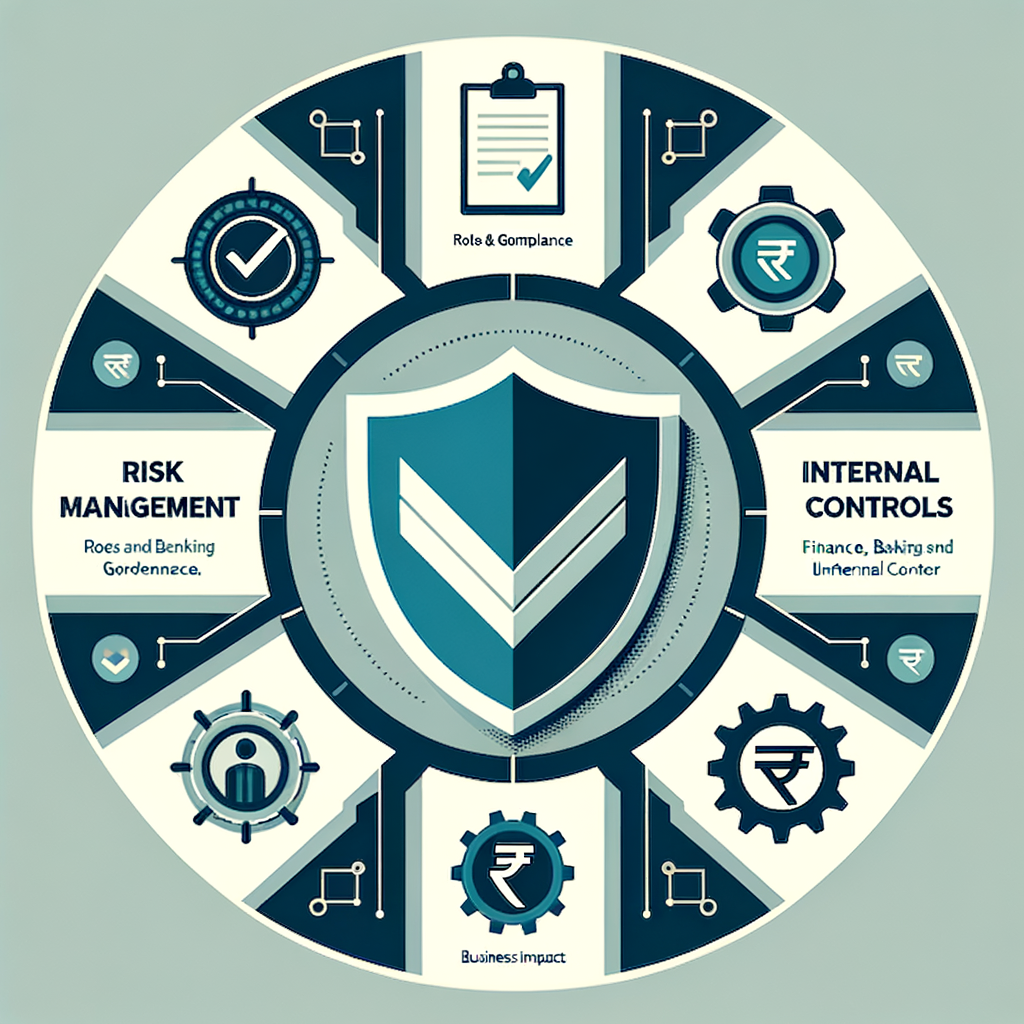The CS Role in Risk management and Internal Controls: Your Guide to a Secure Business
In India’s dynamic and competitive business landscape, navigating risks is not just a concern for large corporations. For small and growing businesses, a single unforeseen event—be it a regulatory penalty, a data breach, or a supply chain disruption—can be catastrophic. This is where a proactive strategy becomes essential. The process of identifying and mitigating these potential threats is known as risk management, while the specific systems and procedures put in place to achieve this are called internal controls. This post will demystify the essential CS role in risk management and explain how these professionals serve as the first line of defense for your company’s financial and operational health. We will explore why the importance of internal controls in India cannot be overstated and how a Company Secretary (CS) is the key to building a resilient business foundation.
Beyond Compliance: The Evolving Role of the Company Secretary
For many business owners, the image of a Company Secretary is often confined to that of a compliance officer—someone who handles paperwork and ensures statutory deadlines are met. While this is an important part of their duties, this traditional view is outdated and significantly undervalues their strategic contribution. The modern CS has evolved far beyond a purely administrative function. They are now integral strategic partners who play a pivotal role in corporate governance, long-term planning, and, most critically, in shielding the company from potential harm. Understanding this evolution is the first step toward leveraging their expertise for sustainable growth and a stronger competitive edge.
From Administrator to Strategic Architect
The traditional responsibilities of a Company Secretary primarily revolved around statutory compliance. This included tasks like filing annual returns with the Registrar of Companies (ROC), maintaining minutes of board meetings, and ensuring all statutory registers were up-to-date. While these tasks remain fundamental, the modern role of company secretaries in risk management has expanded dramatically. Today, a CS is a strategic advisor who sits at the heart of corporate governance. They are deeply involved in evaluating the potential impact of business decisions, advising the board on governance best practices, and developing frameworks that embed risk mitigation into the company’s DNA. They have transitioned from being record-keepers to being the architects of the company’s governance and control structure, ensuring the entire edifice is built on a foundation of integrity and foresight.
Why Your Business Needs a Proactive CS
A proactive Company Secretary does more than just prevent legal trouble; they create value and foster an environment where the business can thrive securely. Their involvement leads directly to more informed decision-making at the board level, as they provide critical insights into the compliance and governance implications of any strategic move. This proactive stance significantly boosts investor confidence, as financiers and partners are more willing to invest in a business that demonstrates robust controls and a clear understanding of its risk landscape. Think of your CS as the “architect” of your corporate structure. Just as a building architect ensures the foundation is strong enough to support a skyscraper, a CS ensures your company’s governance and control foundation is robust enough to support ambitious growth plans. Effective company secretaries and risk management practices are not just about defense; they are about enabling aggressive yet secure growth. A deeper understanding of The Role of a Company Secretary in Corporate Governance reveals their full strategic importance.
Unpacking the CS Role in Risk Management
The core of the CS role in risk management lies in a systematic process of identifying, assessing, and mitigating threats before they can impact the business. This isn’t a one-time task but a continuous cycle that adapts to the changing internal and external environment. A Company Secretary brings a unique 360-degree view, combining legal acumen with business understanding to create a comprehensive risk management framework that protects the company on all fronts. This structured approach moves the business from a reactive “fire-fighting” mode to a proactive state of preparedness, ensuring stability and predictability even in a volatile market.
Identifying and Assessing Business Risks
A skilled CS helps the management team look beyond the obvious and identify risks across various critical categories. This holistic assessment is crucial because a threat in one area can often trigger a cascade of problems in others. A CS meticulously categorizes and evaluates these risks:
- Financial Risks: These are threats to the company’s financial health and stability. A CS helps identify issues like poor cash flow management, excessive reliance on a single customer (credit risk), inadequate funding for growth, or volatile foreign exchange exposure. They analyze financial statements and forecasts to pinpoint vulnerabilities.
- Operational Risks: These are risks arising from failures in day-to-day business processes. This includes everything from supply chain breakdowns and IT system failures to internal fraud or the loss of key personnel. The CS works to map out these processes and identify weak points that could disrupt business continuity.
- Compliance Risks: This is a major area of focus for a CS in India. It involves the risk of legal or regulatory sanctions due to non-adherence to a complex web of laws, including the Companies Act, 2013, GST regulations, Income Tax laws, FEMA guidelines, and various labor laws. A CS ensures the company stays on the right side of the law, avoiding hefty penalties and reputational damage.
- Strategic Risks: These are threats that could derail the company’s long-term goals. They arise from external factors like new market competitors, fundamental shifts in customer preferences, disruptive technologies that make products obsolete, or changes in the political and economic environment. The CS helps the board consider these “big picture” risks during strategic planning.
Key Risk Management Strategies for CS in India
Once risks are identified and assessed, the Company Secretary helps implement a clear and actionable framework to manage them. Not all risks can be eliminated, so a strategic approach is needed. The primary risk management strategies for CS in India include:
- Risk Mitigation: This is the most common strategy. It involves developing and implementing policies and procedures to reduce the likelihood of a risk occurring or to minimize its impact. For example, implementing a stringent vendor verification process mitigates the risk of supply chain fraud, while regular data backups mitigate the impact of an IT system failure.
- Risk Transfer: This strategy involves shifting the financial consequences of a risk to a third party. The most common tool for risk transfer is insurance. A CS advises on obtaining appropriate insurance coverage, such as Director and Officer (D&O) liability insurance, cyber insurance, or property insurance, to protect the company’s assets.
- Risk Acceptance: For risks that have a very low probability of occurring and a low potential impact, it may be more cost-effective to simply accept them. The CS helps the management make a conscious and informed decision to accept a particular risk without spending resources on mitigating it.
- Risk Avoidance: In some cases, a risk may be so severe that the best course of action is to avoid the activity altogether. For instance, after a thorough risk assessment, a company might decide not to enter a particularly volatile foreign market or launch a product line that carries significant liability risks.
For further information on best practices, Company Secretaries often refer to the standards and guidance notes published by the Institute of Company Secretaries of India (ICSI).
Building a Fortress: The CS and the Internal Controls Framework
While risk management is the overall strategy, internal controls are the specific tools and actions used to execute that strategy. The Company Secretary is instrumental in designing and implementing a robust internal controls framework that acts as a fortress, protecting the company’s assets, ensuring the accuracy of financial records, and promoting operational efficiency. This framework is the practical manifestation of good governance and is essential for preventing fraud, errors, and waste.
What Are Internal Controls? A Simple Guide for Business Owners
In the simplest terms, internal controls are the “rules of the game” that keep your business running smoothly, honestly, and effectively. They are the policies, procedures, and systems you put in place to safeguard your company. Think of them as the guardrails on a highway—they keep you on the right path and prevent costly accidents. The importance of internal controls in India is paramount for building a scalable and trustworthy business.
Here are some practical examples of internal controls:
- Requiring two authorized signatures on checks above a certain amount.
- Conducting regular, surprise physical counts of inventory and cash.
- Mandating periodic password changes for all employees on company systems.
- Segregating duties so the person who issues invoices is not the person who receives payments.
- Implementing an approval hierarchy for all major expenditures.
The internal controls framework for CS professionals involves formalizing these common-sense practices into a documented and enforceable system.
Designing and Implementing an Internal Controls Framework for CS Professionals
A CS doesn’t just suggest these rules; they help weave them into the fabric of the organization by designing a comprehensive framework. The development of internal controls for CS professionals in India typically focuses on three key areas:
- Financial Controls: These are designed to protect the company’s financial assets and ensure the integrity of its financial reporting. A CS helps establish:
- Segregation of Duties: Ensuring that no single individual has control over all aspects of a financial transaction. For example, the person approving a purchase order should be different from the one processing the payment.
- Authorization Hierarchies: Creating a clear policy that specifies who can approve transactions of different types and values.
- Regular Reconciliations: Implementing mandatory and timely bank reconciliations, accounts receivable, and accounts payable reconciliations to catch discrepancies early.
- Operational Controls: These controls focus on the efficiency and effectiveness of the company’s core business processes. A CS assists in:
- Developing Standard Operating Procedures (SOPs): Documenting the correct way to perform critical tasks to ensure consistency and quality.
- Asset Protection Measures: Implementing controls to safeguard physical assets (like inventory and equipment) and intangible assets (like data and intellectual property).
- Data Security Protocols: Working with IT to establish protocols for data backup, access control, and cybersecurity to prevent breaches.
- Compliance Controls: These ensure the company adheres to all applicable laws and regulations. A CS will typically:
- Create a Compliance Calendar: A master document that tracks all statutory filing deadlines with bodies like the Ministry of Corporate Affairs (MCA), Income Tax Department, and GST authorities.
- Maintain Statutory Registers: Ensuring all legally required registers (like the Register of Members, Register of Directors, etc.) are accurately maintained.
- Oversee Timely Filings: Managing the entire process of preparing and submitting documents to the Ministry of Corporate Affairs (MCA) portal and other government agencies.
The Legal Mandate: Risk Management Under the Companies Act, 2013
Strong risk management and internal controls are not just good business practices; in India, they are a legal requirement under the Companies Act, 2013. The law places the ultimate responsibility on the company’s Board of Directors to ensure that adequate systems are in place. The Company Secretary is the professional uniquely positioned to guide the board in fulfilling these statutory obligations, making the CS role in risk management India a legally significant function.
Directors’ Responsibility and the Role of the CS
Section 134(3)(n) of the Companies Act, 2013, is a critical provision. It mandates that the Directors’ Responsibility Statement, which is part of the Board’s Report, must include a declaration that the directors have established a proper and adequate internal financial controls system and that these controls are operating effectively. This is a significant responsibility with potential legal ramifications for directors if not met. The Company Secretary is instrumental in this process. They work with management to design the control framework, prepare documentation that evidences these controls, and provide the board with the necessary assurances to make this declaration confidently and accurately. The CS acts as the board’s conscience and chief advisor in this domain.
The Role of the Audit Committee
For certain classes of companies (including all listed companies and certain large public companies), the Companies Act, 2013, mandates the formation of an Audit Committee. This committee has a specific oversight role regarding financial reporting, internal controls, and risk management. The Company Secretary plays a crucial coordinating role here. They act as the central point of contact between the board, the senior management, the internal auditors, and the statutory auditors. The CS ensures that the Audit Committee’s agenda includes a thorough review of risks and controls, that management’s reports on these matters are clear and comprehensive, and that the committee’s recommendations are properly documented and implemented by the company. This facilitation ensures that the entire governance structure for risk management functions seamlessly.
Conclusion
In today’s complex business world, the modern Company Secretary is far more than a compliance officer; they are a guardian of the company’s future. A proactive CS role in risk management is central to building a business that is not only profitable but also resilient, stable, and well-governed. By identifying potential threats, designing intelligent mitigation strategies, and building a robust internal control framework, a CS provides the board and management with the confidence to pursue growth without being derailed by unforeseen events.
Ultimately, viewing professional CS services as a mere expense is a shortsighted perspective. It is a strategic investment in your company’s long-term security, reputation, and success. A strong governance backbone is what separates businesses that last from those that don’t.
Is your business protected against financial and operational risks? Don’t leave it to chance. Partner with TaxRobo’s expert Company Secretaries to build a resilient risk management framework. Contact us today for a free consultation!
Frequently Asked Questions (FAQs)
1. Is it mandatory for a private limited company in India to appoint a Company Secretary?
As per the Companies Act, 2013, and its rules, a private company with a paid-up share capital of ₹10 crore or more is required to appoint a full-time Company Secretary (CS). This is detailed under the regulations for Appointment and Qualifications of Company Secretaries: Section 203. However, even for smaller companies that do not meet this threshold, leveraging professional CS services for compliance, governance, and risk management is a highly recommended best practice that builds a strong foundation for future growth.
2. What’s the main difference between internal audit and the CS’s role in internal controls?
The roles are complementary but distinct. The Company Secretary is primarily involved in the design and implementation of the internal controls framework for CS. They help set up the systems, policies, and procedures. An internal auditor, on the other hand, comes in to evaluate and test whether those controls are designed appropriately and are working effectively in practice. The Primary Purpose of Internal Audit in the Modern Organization is to provide this independent check and report their findings to management and the audit committee.
3. How does effective risk management help my business secure funding?
Investors, venture capitalists, and lenders look for well-governed and professionally managed companies. A strong framework for risk management and internal controls is a clear signal that your business is stable, transparent, and less likely to face catastrophic failures. It demonstrates that management has a firm grip on the business operations. This significantly increases investor confidence and their willingness to provide capital. The role of company secretaries in risk management is key to building this investor trust and making your business more attractive for funding.
4. What are the first practical steps to improve internal controls in my small business?
You can start improving your internal controls immediately with a few simple, high-impact steps.
- Segregate Financial Duties: The most crucial control. Ensure the person handling cash or making payments is not the same person responsible for recording those transactions in the books.
- Implement an Approval Matrix: Create a simple, written policy that states who has the authority to approve expenses up to certain limits.
- Conduct Surprise Checks: Periodically perform unannounced physical counts of your inventory and petty cash to deter theft and identify discrepancies quickly.
- Consult a Professional: Engage a professional from a firm like TaxRobo to help you formalize these processes and identify other control gaps specific to your business.



